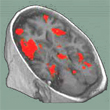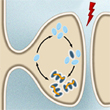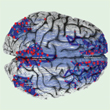Wednesday, 14 August 2013
A Monthly Podcast On Cognitive Science

Do you love in-depth interviews with famous names in the vast field of cognitive science? Does the idea of spending an hour with philosopher Patricia Churchland, neurobiologist Christof Koch, or affective neuroscientist Jaak Panksepp sound pretty good to you? Then you have to take a look at the web site Brain Science Podcast!
Brain Science Podcast was created in 2006 by Dr. Ginger Campbell, an emergency physician with a passionate interest in the brain, consciousness, and the medical implications of the mind-body relationship, and she has been hosting it ever since. From one month to the next, she alternates between interviews with scientists who are leaders in their fields and detailed reports on recent books on topics in which she is interested. (more…)
From Thought to Language | Comments Closed
Tuesday, 6 August 2013
“Centres” of Cognitive Functions in the Brain: A Misleading Concept

The media nowadays often publish reports that scientists using brain-imaging technology have just discovered the brain’s “centre” for anger, jealousy, generosity, or some other specific emotion or cognitive function. But the idea of such a centre is, at best, an outrageous oversimplification, and at worst, completely misleading.
That is the argument made by Dr. William A. Cunningham in the February 2012 issue of the journal Current Directions in Psychological Science. His article deconstructs a very limited view of a part of the brain called the amygdala,which the popular press often describes as the brain’s “fear centre”. (more…)
Emotions and the Brain | Comments Closed
Monday, 29 July 2013
The Return of the Invisible Gorilla

Somewhat like Stanley Milgram’s experiment on obedience to authority, the “invisible gorilla” experiment by Daniel Simons and Chris Chabris has become a true classic in the cognitive sciences. Milgram surprised readers with chilling evidence that people could be so compliant to authority that they would carry out orders to inflict potentially fatal electrical shocks on other individuals. Similarly, Simons, Chabris and their gorilla have overturned our belief that we always see all the things that lie in our field of vision. (more…)
The Emergence of Consciousness | Comments Closed
Wednesday, 24 July 2013
Oligomers Help Us Keep Our Memories
 A protein whose molecules have the special ability to stack on top of one another, somewhat like egg cartons, and thus form short, highly stable chains (oligomers), may well play a key role in the mechanisms by which we maintain lasting memories.
A protein whose molecules have the special ability to stack on top of one another, somewhat like egg cartons, and thus form short, highly stable chains (oligomers), may well play a key role in the mechanisms by which we maintain lasting memories.
Indeed, there is always something magical about remembering something that you haven’t thought about in years. But physically speaking, in what form is the corresponding memory trace maintained in your brain over all that time? Neurobiologists know that the whole process occurs in the synapses (the plastic connections between neurons) and have described molecular mechanisms such as long-term potentiation that partly explain this plasticity. (more…)
Memory and the Brain, Mental Disorders | Comments Closed
Monday, 15 July 2013
The Brain’s Default Network

What does the human brain do when it’s not doing anything in particular? At first glance, this question might seem of little interest, and for many years most brain researchers paid little attention to it. But over the past 10 years or so, it has become one of the hottest and most intriguing research topics in neuroscience: the activity of the brain’s default network.
The default network is a set of areas in the brain that are connected to one another, in some cases across large distances (in terms of the brain’s size). They are activated preferentially when the individual is not performing any specific task. Scientists do not yet know exactly what purpose this default brain activity serves. But they do already know that the areas involved in the default network are more active when our minds are wandering (when we have “our heads in the clouds”), when we are evoking personal memories, and when we are trying to imagine ourselves in future situations or to understand someone else’s point of view. (more…)
The Emergence of Consciousness | Comments Closed







